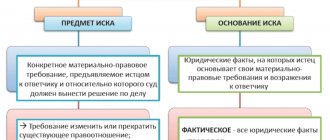Where to go first?
If there is a need to remove a child from an apartment by court, first obtain two documents:
- Certificate of persons registered in the apartment. It will indicate exactly who is registered, from what time and in what relationship with the owner of the property. This document must be attached to the claim with a request to discharge the minor from the living space. You can get a certificate from the Criminal Code, Homeowners Association, passport office at your place of residence, or the police department.
- An extract from the Unified State Register of Real Estate about registered rights to the apartment. Thanks to her, it will become clear whether this child is the owner or just lives in the apartment. If the owner, it is impossible to write it out through the court.
Armed with these documents, you can begin preparing documents for the court. To do this, you need to decide on the grounds for the discharge (they must be specific and significant), the legislative framework and evidence in the case.
Who is right?
A lot of situations may arise when a minor child remains registered in the apartment. For example, the seller moved with his family from their home to a new apartment, but did not release the children because guardianship did not allow him.
It is difficult to discharge a child through the court, but it is possible. As you prepare for trial, keep a few things in mind:
- young children (under 14 years old) must be registered with their parents;
- It will not be possible to discharge the child “to nowhere”; you will have to look for an alternative address or prove that the child actually lives in another place;
- housing at a different address should not be worse than the previous one.
The difficulty is that children are very seriously protected by the state, and every child must have a home, sometimes even to the detriment of the rights of other citizens.
Is it possible to expel a minor child from an apartment?
The question of whether the owner, if there are good reasons, can discharge a person who has not reached the age of majority, and if so, how, interests many people. Unfortunately, there is no clear answer to this; it all depends on the grounds for the emergence of housing rights and on a number of other related circumstances.
From the municipal
If the person being discharged or his parents do not own any other housing, the guardianship authority will refuse, since the minor did not exercise the legal right to participate in privatization, after which part of the living space would be at his disposal.
From privatized
Extracting from private property is also not an easy procedure. For example, if on the day of privatization a minor was already registered there, but his legal representative decided not to include the child in privatization, the latter is given the right to live in the apartment for life.
The most common reasons:
- The apartment has been sold or alienated in any other legal way. In this case, all residents’ right to use the sold living space is terminated. This is stated in paragraph 1 of Art. 35 Housing Code of the Russian Federation.
- In fact, the family lives at a different address and simply refuses to leave.
- There is no information about the location of the parents.
- Further cohabitation is impossible, since a threat is created to the interests of the child.
- The child and his parents never lived in this apartment.
- The child was registered in the apartment fictitiously.
A child who cannot be evicted even through court
There are also minors who cannot be discharged even through the court, even if there are good reasons. These include:
- children-owners of housing (those who are indicated as copyright holders in the extract from the Unified State Register or certificate of ownership);
- those living under a will (if the testator prescribed their right to live in the will) - even if the apartment was sold to a new owner;
- minors under 14 years of age, if they do not have an alternative residential address;
- children who refused to privatize the apartment;
- the child does not temporarily live in the apartment for a good reason - he is being treated somewhere or studying;
- the owner of an apartment or share will not be able to register his minor child (son or daughter) or grandson/granddaughter.
In these cases, you will either have to wait until the child reaches the age of majority, or negotiate the voluntary discharge of the child with his parents, or change the title owner.
Child protection
The consent of the guardianship authorities is necessary for transactions with real estate - sale, exchange, exchange, rent, etc. That is, it is impossible to discharge a child from the apartment being sold, if he is one of the owners, without the permission of the authorized authorities. Also, the consent of the PLO will be required if the apartment from which you are being discharged is municipal.
Important! If the move has a negative impact on the child, a refusal will be received from the guardianship authorities (another school, inability to attend clubs, sections, etc.).
What is needed for registration
Required documents:
- application for re-registration;
- passports, birth certificate (up to 14 years);
- documents on ownership of both apartments (the one being sold and the one being bought);
- technical passports of both apartments to compare living conditions;
- personal account and social rental agreement (for municipal housing);
- a certificate from the passport office (stamp in the passport) confirming the current registration.
If parents live separately, they must come together. The consent of the second parent in writing, certified by a notary, is acceptable. The application and submitted documents are reviewed within 14 days.
For your information! A waiver from the guardianship authorities will be obtained if the living conditions in the new house are worse (with the exception of divorce and division of property).
Legislative basis
Laws governing registration/discharge issues, including when a child is required to be discharged from an apartment by court:
- International “Convention on the Rights of the Child” of November 20, 1989 (Article 9).
- Law No. 5242-1 of March 25, 1993 “On registration of citizens of the Russian Federation.”
- Federal Law No. 48 of August 24, 2008 “On guardianship and trusteeship.”
- The right of a guardian or trustee to represent the interests of a minor ward in court (Article 37 of the Civil Code of the Russian Federation).
- The need to alienate rights to real estate only with the consent of the guardianship and trusteeship authorities where the minor child lives is, for some cases, enshrined in clause 4 of Art. 292 of the Civil Code of the Russian Federation.
- The statute of limitations for eviction or deregistration of a child is 3 years (on a general basis), more than 3 years (special terms), no longer than 10 years (counted from the date of violation of the right). An indication of the deadlines is given in Art. 196 of the Civil Code of the Russian Federation and Art. 197 Civil Code of the Russian Federation.
Important! The guardianship and trusteeship authorities or the prosecutor's office have the right to appeal any illegal actions regarding the removal of a minor from the apartment.
Conditions for removing a minor from registration of place of residence
A known difficulty in such cases is finding an alternative address for registering the child. Discharge from the living space occurs only together with the discharge of one of the parents or guardian.
The living space allocated to the child for the next registration must be suitable in size and meet all the requirements for normal living. If, when trying to discharge a minor through the court, documents on the new property (residence address) are not attached to the claim, then the case may be refused.
Note! If the living conditions of a minor deteriorate, the guardianship and trusteeship authorities have the right to appeal the deregistration even if the child is not the owner of the home . Members of the commission of the guardianship department of the administration will conduct a study of living conditions and draw up an act.
For example, parents filed for divorce, mother and child began to live in too small a living space. The court may recognize the fact of violation of the child’s interests and force the father to place the child in his apartment again.
Instructions for discharging a minor child from a municipal apartment
The guardianship authority will allow the minor to be discharged only if two conditions are met:
- after deregistration, the child will immediately be registered at the new place of residence (one of the parents or a legal representative must be registered with him);
- the new apartment will have no worse living conditions and no less area than the previous one.
In all other respects, the procedure is almost no different from the discharge of a minor owner from a privatized apartment. Only the necessary package of documents for the guardianship authority should be supplemented with a social tenancy agreement.
A couple of pre-trial nuances
In some cases, before going to court, you need to change the title owner of the apartment. This is necessary if the plaintiff and the child are related - parents and children, grandparents and grandchildren, even aunts/uncles and nieces. The new owner must not be a relative of the child.
It also happens that defendants need to send a pre-trial demand for eviction, otherwise the court may reject the claim. To do this, you need to draw up a request in free form and send it by registered mail to your registration address. A month later, if there is no response, go to court.
Let's go to court
The procedure for removing children from an apartment through the court:
- Send the defendants by letter with notification and inventory the second copies of the statement of claim and documents attached to the claim.
- Submit the claim and the documents attached to it (together with the postal inventory) to the judicial authority.
- Arrive at the time appointed by the judge for the hearing on the case. Prepare evidence for your position.
- Wait for the court's decision and receive your copy of the decision by mail. The announcement of the decision in person occurs when the defendants have attended all court hearings. In this case, the parties receive their copy of the decision in the office of the judicial institution.
- With the court's decision, contact the MFC or other registration authority to formalize the child's removal from the apartment.
Note! Be sure to send letters with an inventory to the defendants, otherwise the court may reject the claim on the grounds that the defendant was not familiar with your requirements.
Required documents
- statement of claim (sample) in several copies according to the number of signatories, defendants, plus a copy for the judge;
- copy and original passport of the plaintiff (plaintiffs);
- a document proving the absence or loss of the rights of the child and his parents (guardians, adoptive parents) to live in the apartment (for example, a certificate of non-residence from the district police officer, a certificate, a purchase and sale agreement, etc.);
- copy of the personal account for the apartment (
) from HOA, TSN or housing cooperative - contains data on rent; - extract from apartment card or house register (
) – reflects the number of people registered in the apartment; - extract from the Unified State Register of Real Estate – confirms ownership of the apartment;
- title document for real estate - purchase and sale agreement, certificate of inheritance, privatization agreement, deed of gift, share participation agreement, assignment agreement;
- documents for the property in which the child is planned to be registered (if any);
- a copy of the divorce certificate (if the child’s parents were divorced);
- a copy and original of the minor child’s birth certificate (or his passport, if he is already 14 years old);
- receipt of payment of state duty.
Procedure for discharge
Before applying, you must understand that the court does not discharge citizens. The result of filing a claim will be a decision on the basis of which passport officers are obliged to discharge the minor.
Extrajudicial
This procedure for resolving disputes involves an attempt by the plaintiff to reach an amicable agreement with the defendant. That is, you need to talk with the parents and try to convince them to sign the child out of someone else’s apartment. In practice this rarely happens. Especially if people have no other place for registration, and being discharged to nowhere threatens administrative liability and the loss of certain benefits.
Through the court
The claim is filed at the place of residence of the minor, if it is unknown, at the place of registration (address of the disputed real estate). The subject of the claim will be the discharge of citizens due to the loss of the right to use the premises. It must be indicated that the presence of a child registered in the living space infringes on the rights of the owner. The following is attached to the claim:
- copy of passport;
- an extract from the house register;
- USRN extract;
- a copy of the document confirming the ownership of the property;
- receipt (state duty for non-property claims is 300 rubles).
You need to contact the district court. It is better to fill out the statement of claim using a ready-made sample or with the help of a qualified lawyer.
Errors in registration may cause the court to refuse to accept the claim. You should prepare in advance and collect evidence. The plaintiff must convince the court of the correctness of his claims.
Questions and answers
Is it possible to discharge a child to nowhere?
It is forbidden. When the minor is discharged by the court, the plaintiff will be denied. This is done in order to leave the living space for the minor until suitable housing is found for the child’s next registration.
Does the child's father have the right to discharge him without the mother's consent?
No, the father or other relative of the child cannot discharge him until he reaches adulthood. Even if the marriage with the child’s mother is dissolved, the family relationship does not end and such a divorce does not affect the child’s rights of residence - the Supreme Court of the Russian Federation spoke about this in Resolution of the Plenum of July 2, 2009 No. 14.
Within what time frame must a minor child be discharged after the court decision enters into force?
Within 3-7 days. The specific period depends on whether the court decision was announced in person or in absentia. If in absentia, then deregistration of the place of residence will take several days longer, but no more than 7 days from the date of contacting the registration authority. If the court decision is already in hand, then it must be issued within 3 days.
What address to indicate in the statement of claim if the child and the parent do not live at the registration address - actual or registered address?
The statement of claim or other documents should indicate the registration address (clause 63 of the Resolution of the Plenum of the Supreme Court No. 25 of June 23, 2015). The plaintiff does not need to know where the defendant lives. A summons to appear at a court hearing will be sent to the registration address (Article 113 of the Code of Civil Procedure of the Russian Federation). If the defendant does not receive notice, then the court will consider the defendant to have been notified. The case will be considered without his participation (clause 4 of article 167 of the Code of Civil Procedure of the Russian Federation).
What should be done if the family leaves for permanent residence?
The standard discharge process is disrupted when the family moves to another country for permanent residence. In this case, the discharge procedure is even easier. Parents submit an application for deregistration, which indicates the reason - moving for permanent residence to another country. By law, no additional documents are required to confirm this fact.
Parents' passports, the child's birth certificate and an application are submitted to the passport office. After 7 days, you will be issued a departure slip, which allows you to freely cross the border without registration.
The removal of minors from registration may be accompanied by some complications due to the enhanced protection of their rights. Upon discharge, it is important that living conditions do not worsen . If there is nowhere to register a child, then even through the court it will not be possible to remove him from registration.
Most of us want to quickly resolve all bureaucratic issues related to re-registration of documents, deregistration, etc. If you want to know how many days it takes to deregister and what needs to be done to speed up this process, as well as how to properly check out from a private house, municipal housing, or apartment while living in another city, and also how to do this through the State Services port and the MFC - read our other materials.









